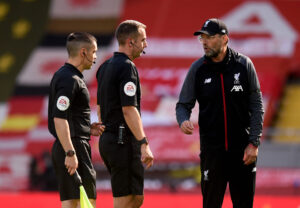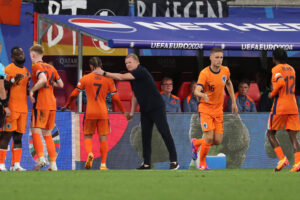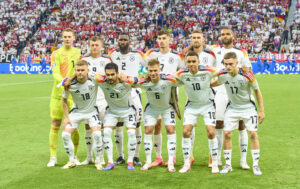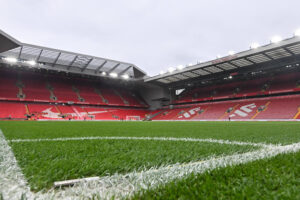Manchester United and Bayern Munich are two of the true aristocrats of European football. They share a great deal of history and similarities but there’s a notable difference at ownership level, which is evident both on and off the field.
Manchester United and Bayern Munich – Good Friends, Better Enemies, When Will They Rise Again?
On the European Super League: Manchester United and Bayern Munich
If you asked the Glazers for their thoughts on the German Model, they’d likely start talking about Heidi Klum and not 50+1.
The failed hijacking of football, otherwise known as the “European Super League” (although how anything could be called super and involve the current iterations of Spurs, Arsenal & Manchester United is beyond this writer), once again brought up the subject of ownership structures in football, and more specifically at Old Trafford.
Of the so-called heavyweights of European football, only Paris Saint Germain and Bayern Munich, as well as Borussia Dortmund, turned down the proposal, albeit for different reasons.
The Qatari state ownership of PSG, placing their chips on failure, viewed it as an opportunity to strengthen their position within European football’s current structures.
Club president Nasser Al-Khelaifi is now the chairman of the European Club Association, replacing Andrea Agnelli of Juventus in the process. A Royal Flush.
On the other hand, Bayern could not enter the project due to the nature of the previously mentioned 50+1 model of ownership in Germany.
The German Model and Fergie’s Admiration for Bayern
The model stipulates that members of clubs retain 50% of the voting shares, plus one share, ensuring outside investors cannot obtain a majority stake and control.
In other words, fans have a voice. Imagine.
While the model may not be perfect; somewhat capping smaller clubs’ ambitions, it is certainly preferable to the toxic ownership of the Glazers, which has only gotten worse in the post-Fergie years.
Ferguson was always a strong admirer of Bayern: ex-players in charge, Uli Hoeness & Karl Heinz Rummenigge, Oliver Kahn & Hasan Salihamidžić – the right way to run a football club in his view.
A penny for his actual thoughts on United – maybe Khabib will get that out of him one day.
Two Peas in Separate Pods
Moving away from ownership and to the essence of United and Bayern, and many similarities are seen in their position in their respective countries: the biggest, the most popular, the most hated, the most glamorous, and the most domestically successful.
Both clubs have also used their alpha status and financial power to cherry-pick talent from their leagues, taking the best of the rest – see Bayern pillaging Dortmund and Leipzig and United signing Keane, Cole, Ferdinand, Rooney, Van Persie et al. under Ferguson.
This has had a detrimental effect on the competitiveness of the Bundesliga, with Bayern on course to win their 10th title in a row but is also in part due to the desire of most German-based players to play for the club.
Bayern are viewed as the place to win major honours both domestically (duh) and on the continent, as well as somewhere to build your own personal brand on the global football stage.
In better days, the same could be said of United, with Gordon McQueen claiming that “99% of players want to play for Manchester United and the rest are liars” following his move from arch-rivals Leeds in 1978.
A Friendship Formed Through Tragedy
With so much in common, it’s hard to think the clubs’ first meeting didn’t take place until 1998 – no side has faced United more in Europe since with 11 games between the pair.
A bond was of course forged well before then, 40 years to be precise, in the aftermath of the Munich Air Disaster, the darkest day in United’s history.
At the time of the tragedy and the years that followed, both Bayern and United have commemorated those who have been lost, and it’s seen as the beginning of a close friendship between the two clubs.
Interestingly, the crash site was renamed Manchesterplatz in 2008 – 50 years on, adding a Mancunian touch to Bavaria.
From 1968, the Two Clubs Go In Different Directions
In the four decades that preceded their first clash, the clubs enjoyed different periods of success, limiting chances of them meeting in European competitions.
Somehow, United quickly rose from the ashes of Munich to create another great side, one that would land league titles and eventually the European Cup in ‘68, as Busby reached his holy grail with the team of Best, Law & Charlton.
While this year marked the end of United’s dominance, it was also the start of Bayern’s, as the likes of Beckenbauer, Muller and Maier captured the Bundesliga title in the ‘68-69 season – only the club’s second national title, and just three years after promotion.
It’s hard to think now, but Bayern weren’t permitted to the first season of Bundesliga in ’63, such was their record in previous seasons.
Bayern and United were now two clubs going in very different directions, which was best encapsulated by the events of the ’73-74 season. As Bayern won the first of three successive European Cups, United suffered the ignominy of relegation from the first division just six years on from their own continental success.
Mark Hughes – The Link Man Between the Two Clubs in the 80s
Throughout the years that followed, the only connection between the clubs was Mark Hughes.
Hughes, then of Barcelona, was sent out on loan to Bayern in ’87-88 in a bid to recapture the form that had deserted in him in Catalonia. His season in Bavaria would eventually pave the way for a return to Manchester, much to the delight of Fergie and United fans.
Arguably the most interesting aspect of Hughes’ time in Germany was the fact he played two games in one day, for two different teams – Wales and Bayern, with a EURO ‘88 qualifier in Czechoslovakia being quickly followed by a German Cup game in Munich.
Let’s Party Like Its 1999 – On-Field Rivalry Begins
Fast forward 10 years and finally there was an on-field occasion between the two clubs, as both were drawn into the dreaded “Group of Death” alongside Barcelona and Brondby.
Two draws and results elsewhere led to both sides qualifying for the knockout stages, where of course they would eventually meet again in the ’99 European Cup Final – Teddy, Ole, Kuffour, Matthäus, everybody knows the rest.
This would kickstart a mini-series between the sides, and their friendly managers – Sir Alex and Ottmar Hitzfeld, who had previously met in ’97 when Hitzfeld, in charge of Dortmund, bested United en route to unlikely final success.
Bayern invited United to play in their centenary game in the summer of ‘00, but it was later in the 00-01 season when they would exact their revenge for the heartbreak of ’99.
This time it was the quarter-finals, and a more powerful Bayern side dominated a United side on the wane, claiming victory in both legs and advancing with a 3-1 aggregate win. The Germans went on to claim their first European Cup since the great side of the mid-’70s.
From a United perspective, the tie is probably best remembered for Karl Power, United prankster, imposter etc., featuring in the team photo prior to the second leg much to the bemusement of the actual players.
European Stagnation in the Mid ‘00s
The sides would clash once again the following season, with the spoils being shared in the second group stages – added in as UEFA expanded the competition.
Neither side won the European Cup this year, or really came close to it during the mid-’00s, as both went through a period of transition – United from Keane and Beckham to Rooney and Ronaldo, and Bayern from Hitzeld to Magath, to Klinsmann, back to Hitzeld and then onto Louis Van Gaal.
In these years, both clubs reached their European nadir – United finishing bottom of their group in ’05-06, and Bayern not even making it that far, having finished 4th in their ’06-07 Bundesliga campaign.
Rivalry Resumes
United would bounce back and embark on another golden period, with three successive league titles and back-to-back European cup finals in ’08 and ’09. Owen Hargreaves, member of that ’01 Bayern side, was a key man in the ’08 success, having signed the summer prior, before his career ended due to knee issues.
Bayern, on the other hand, had not made it as far as the semi-finals since ’01, but this would change under Van Gaal.
The sides would meet in another quarter-final in the spring of ’10, with United looking to complete a League and European double again, this time shorn of Ronaldo and Tevez but with Wayne Rooney at his absolute peak.
Rooney would strike within 2 minutes of the first leg at the Allianz Arena, a game this writer attended, before Bayern emerged 2-1 winners with the help of a deflection and shoddy United defending.
A loss was bad, but the ankle injury Rooney sustained was of far more concern – the league was lost as a result, and he was never the same player.
Despite Rooney somehow making it back for the second leg, Bayern would progress on away goals and towards a final loss to Mourinho’s Inter – Nani at the double, Darron Gibson with a bullet putting United 3-0 up before that man Olic again and an absolute peach from Arjen Robben killed off United.
However, the tie went away from United prior to Robben’s dagger blow when Rafael Da Silva got a second yellow after just 50 minutes.
Fergie blamed it on “typical Germans” surrounding the referee, despite three of the four players not being German. Don’t let the truth get in the way of a good soundbite.
Guardiola – The One That Got Away?
This would be the last meeting between Sir Alex and Bayern, as he retired in ’13, with a 13th league title secured. In the same season, Bayern would again be crowned kings of Europe under Juup Heynckes before Pep Guardiola took over that summer.
Should United have hired Guardiola? Was the Bayern deal done before Fergie knew retirement beckoned? It was certainly a seminal moment in hindsight, added to by the appointment of David Moyes as Fergie’s successor.
As Moyes stumbled in the league, a semblance of solace was found in Europe, and again Bayern were waiting in the quarters.
United went ahead in both legs, Nemanja Vidic scoring in a 1-1 home draw, before Patrice Evra rocketed in an opener in Munich, sparking scenes of delirium in the away end. The joy would be short-lived as Bayern roared back, equalising within a minute, advancing with a 3-1 win (4-2 on aggregate).
Van Gaal and Schweinsteiger
Moyes was sacked after 10 months and replaced by Van Gaal, beginning the cycle of ever-changing managers at United.
The Dutchman was largely a bust, playing outdated football and signing numerous duds, including Bastian Schweinsteiger from Bayern.
Not learning their lessons from Hargreaves, United again signed an injury-prone player and didn’t seem to wonder why Bayern were so content to sell a club legend at a cut-price rate. One of the many symbols of United’s incompetence in the post-Fergie malaise.
Worlds Apart – On and off the Field
Since Van Gaal and Schweinsteiger’s departures, there’s been relatively few direct links between the clubs.
Exceptions being the annual Munich remembrance and a 20-year anniversary game of the ’99 final at Old Trafford.
Newly appointed interim manager Ralf Rangnick served as a mentor, as well as an inspiration, to Bayern head coach Julian Nagelsmann while together at RB Leipzig. Count it as well.
Bayern continue to dominate Germany and secured a sixth European Cup in ’20, while United have failed to mount any title challenge since ’13 and struggle to get out of the group stages in Europe.
When will these two great clubs look each other once again in the eye as equals, both on and off the pitch? Who knows, but with the current ownership structures in place at both clubs, it’s hard to see that day being anytime soon.
German model? 50+1 for Bayern, Heidi Klum as a brand ambassador for United.
Main Photo






